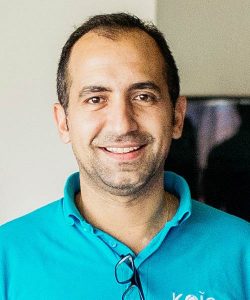cs@ucy.ac.cy | +357-22-892700
| | | | MyCS Portal |
Kolios Panayiotis
Faculty
Contact

- Position:
- Assistant Professor
- Address
-
Office: FST 01 116,
Department of Computer Science,
University of Cyprus,
1 Panepistimou Avenue
-
Aglantzia
-
Nicosia
-
2109
-
CYPRUS
- Phone
- (+357) 22892695
- Fax
- (+357) 22892701
- kolios.panayiotis-AT-ucy.ac.cy
- Website
- https://www.kios.ucy.ac.cy/pkolios
Miscellaneous Information
-
Ph.D., King’s College, London, UK, 2011 Panayiotis Kolios received his BEng degree in Telecommunications Engineering from King’s College London in 2008. He then joined the Centre for Telecommunications Research at King’s College as a PhD student, funded by an EPSRC DTA scholarship. During his doctoral training studies, he worked on energy efficient wireless networking architectures; contributing to the Mobile VCE Green Radio project. He was awarded the Ph.D. degree on January 1st, 2012.
Subsequently he joint the Department of Communications and Internet Studies at the Cyprus University of Technology where he conducted research on the development of terrestrial maritime communications as a low-cost alternative (to satellite links) solution to support Internet-like services over the sea. He then joint the Department of Computer Science (CS) of the University of Cyprus (UCY) as a visiting lecturer teaching both undergraduate and postgraduate courses on systems and networks, programming and introductory courses on computer science. At the same time he conducted research on ad-hoc device-to-device communications.
Over the years, Panayiotis served as a visiting researcher at the Department of Informatics, King’s College London, and the Department of Mathematics, London School of Economics and Political Sciences. As of late, he has also build strong collaborations with the Institute of Security Science and Technology at Imperial College London. He has successfully secured more than 6 European research and innovation funded projects, and 4 industrial funded project totalling more than 40 Million Euros to date, that have been invested in the aforementioned research and innovation activities of the KIOS Center of Excellence.
From June 2013 to January 2024 served as a senior researcher at the KIOS Research and Innovation Centre of Excellence of the University of Cyprus, where he focused on both basic and applied research on networked intelligent systems. Some examples of systems that fall into the latter category include intelligent transportation systems, autonomous unmanned aerial systems and the plethora of cyber-physical systems that arise within the Internet of Things. Particular emphasise was given to emergency management in which natural distasters, technological faults and man-made attacks could cause disruptions that need to be effectively handled. Tools used include graph theoretic approaches, algorithmic development, mathematical and dynamic programming, as well as combinatorial optimization.
His research interests focus on both basic and applied research on networked intelligent systems. Some examples of systems that fall into the latter category include intelligent transportation systems, autonomous unmanned aerial systems and the plethora of cyber-physical systems that arise within the Internet of Things. Particular emphasis is given to emergency management in which natural disasters, technological faults and man-made attacks could cause disruptions that need to be effectively handled. Tools used include graph theoretic approaches, algorithmic development, mathematical and dynamic programming, as well as combinatorial optimization.



